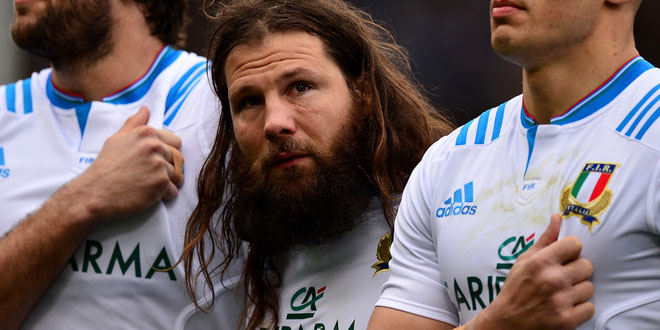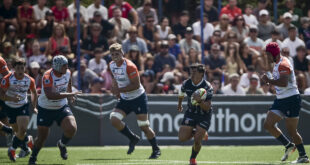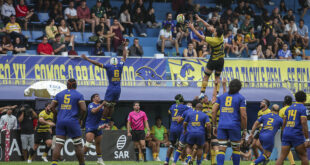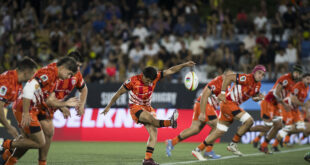In a significant reveal for rugby, a top player took to the field for an elite country in four World Cups and played in over 100 test matches despite not being eligible to do so. Italy fielded an ineligible player at Rugby World Cup 2003 and in three subsequent tournaments.
Martín Castrogiovanni played for Italy against Canada, New Zealand, Tonga and Wales at RWC 2003 in Australia. He faced New Zealand, Portugal, Romania and Scotland at RWC 2007 in France. He played in four matches in RWC 2011, taking-on Australia, Ireland, Russia, and the USA. At RWC 2015 he played against Canada and France.
The prop from Paraná, Argentina qualified for Italy via a grandparent; however, Castrogiovanni explained to Hernando de Cilla that his connections to Italy are through his father’s grantparents.
World Rugby player eligibility laws do not permit a player to qualify via a great-grandparent. Qualifying via ancestry can be via a parent or a grandparent but not a great-grantparent. This is true in 2022 and it was also true when he debuted for Italy and throughout his test career.
Castrogiovanni was called-up by John Kirwan to play for Italy in 2002. He had moved to the country from Argentina at the age of 19 in 2001. His first cap came after playing for Argentina at u19 and u21 levels. He played alongside Pumas greats Patricio Albacete and Juan Martín Hernández.
His fourth test cap was against Argentina in November, 2022. Two months earlier he had started against Romania in Parma. Herein lies the problem: Italy vs Romania was a Rugby World Cup 2003 qualifying match. World Rugby (then International Rugby Board – IRB) disqualified Russia after learning that players qualifying via grandparents did not actually have Russian grandparents.
Russia’s disqualification from RWC 2003 came before the tournament. As noted, Italy played in that tournament with Castrogiovanni featuring in all four matches. Dr Syd Millar, the then Chairman of the IRB and the Rugby World Cup, said:
“This is a serious and saddening development, especially in the run-up to Rugby World Cup 2003. Unions have to go that extra mile to satisfy themselves beyond any doubt whatsoever that players are indeed eligible to play under the national flag. It is a matter of the greatest regret that Russia, a fine Union with great promise, should lose the chance of qualifying for the Finals in this way. This should be a lesson to others”.
RWC 2003 qualifying had not concluded at the time; in fact, Russia were scheduled to face Tunisia. If Russia breached eligibility based on South African players Johan Hendricks, Reiner Volshenck and Werner Pieterse playing against Spain then Castrogiovanni playing for Italy against Romania asks urgent questions of the application of player eligibility laws.
Castrogiovanni went on to play 119 test matches for Italy. His appearances at RWCs 2007, 2011 and 2015 were when he was technically eligible to play for Italy. This is the case because he played for Calvisano from 2001-2006, Castrogiovanni which could have made him eligible for Italy beginning in 2004.
The player himself says that:
“My biggest idol in rugby was Tati Phelan. There was nobody else like him. I remember at the World Cup in 1999; he had the record for most tackles.”
Phelan and Argentina played against Wales in the opening match of Rugby World Cup 1999. A scandal in March 2000 revealed that New Zealanders Shane Howarth and Brett Sinkinson were not eligible to play for Wales. Their eligibility was via grandparents but neither man had a Welsh grandparent. Howarth played against Argentina, Australia, Japan, and Samoa as did Sinkinson.
Another Grannygate outcome was the discovery that Dave Hilton was not eligible to play for Scotland. Investigations confirmed that he qualified via a grandfather who was from England not Scotland. Hilton played for Scotland at RWC 1999 against South Africa, Spain and Uruguay and he also played at RWC 1995 without being eligible for Scotland.
The IRB took action against the players. Howarth was prevented from playing again for Wales. Sinkinson and Hilton were able to return to qualify via three-years residency to play again in 2002.
Outcomes before and after Castrogiovanni played test rugby suggest that Italy was extremely fortunate. Romania and Spain have since both been disqualified from RWCs for fielding players who were not eligible. Romania’s RWC 2019 disqualification came together with Spain and Belgium’s and followed Tahiti’s disqualification.
Neither Scotland nor Wales were prevented from competing at RWC 2003. Both qualified by virtue of their performances at RWC 1999. This was controversial due to the breaches of eligibility laws and is inconsistent with subsequent decisions. World Rugby disqualified Spain from RWC 2023 because Gavin van den Berg played as a replacement against the Netherlands. Spain won the matches 43-0 and 52-7 to claim maximum competition points.
As a result of the breach, the 10 points earned from Spain’s victories over the Netherlands were removed from the Rugby Europe Championship table. If the same were applied to Wales and Scotland at RWC 1999 then neither would have made the Quarter Finals nor qualified for RWC 2003 directly.
Uneven decisions have been the outcome for breaching eligibility laws. Many questions require answering. For instance, World Rugby has a history of blaming offenders and asking them to learn but has the institution learned itself? If one were to dig deep how many more players are there who played despite not being eligible? Loosening eligibility laws in 2021 was the pathway taken; would tightening laws to attempt to avoid controversy not have been the better option?
 Americas Rugby News Rugby news from across the Americas!
Americas Rugby News Rugby news from across the Americas!




